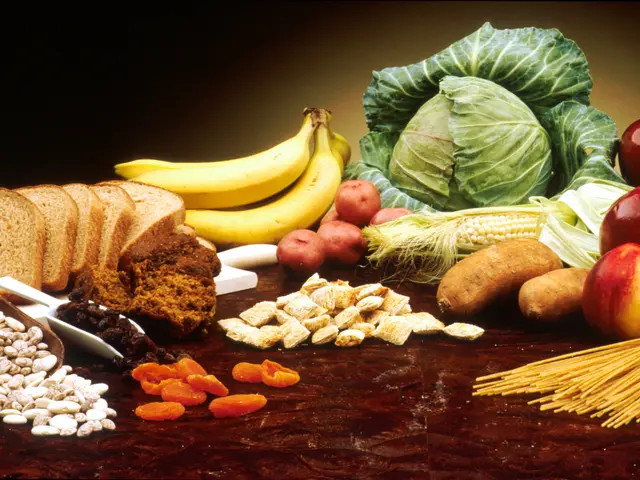Mouth Tasting Sour? Discover the Top Nine Possible Causes
A persistent sour taste in your mouth can be bothersome and confusing, but it's not necessarily a cause for alarm. There are several common causes for this unpleasant sensation, and understanding them can help guide appropriate management.
According to family medicine physician Mark Rood, MD, there are nine common causes for a sour taste in the mouth.
- Dehydration: Lack of adequate water intake can dry the mouth and alter taste perception, often causing a sour or metallic taste. To address this, aim to drink at least eight glasses of water daily.
- Smoking: Tobacco use not only dulls taste buds but also damages oral tissues, potentially leaving a sour taste. Quitting smoking improves taste sensation and oral health over time.
- Poor Oral Hygiene: Inadequate brushing and flossing allow bacterial buildup that leads to infections and bad tastes such as sourness. Maintaining good oral hygiene through regular brushing, flossing, and dental check-ups can reduce bacterial presence and improve oral health.
- Infections or Illnesses: Oral infections (e.g., gum disease, tonsil issues) or systemic infections can cause sour or foul tastes. Seek medical or dental evaluation for diagnosis and treatment; may require antibiotics or other targeted therapies.
- Medications: Some drugs alter taste perception or cause dry mouth, which may produce a sour taste. Consult healthcare providers about side effects; possible alternatives or supportive measures (e.g., saliva substitutes) can be considered.
- Acid Reflux and GERD (Gastroesophageal Reflux Disease): Stomach acid flowing back into the esophagus and mouth leads to a persistent sour or acidic taste. Lifestyle changes (diet modification, weight management), avoiding triggers (spicy, acidic foods, caffeine), and medical treatment (antacids, proton pump inhibitors) help manage symptoms.
- Helicobacter pylori Infection: This stomach bacterium produces gases contributing to sour taste and bad breath. Medical eradication therapy under physician guidance is required to eliminate the infection.
- Small Intestinal Bacterial Overgrowth (SIBO) or Other Gut Bacterial Imbalances: Excess bacteria fermenting undigested food release foul-smelling gases that can cause sour taste. Diagnosis through medical evaluation; treatment includes antibiotics and dietary adjustments.
- Dietary Factors: Frequent consumption of spicy, acidic, or high-protein foods can increase stomach acid or gut fermentation, resulting in sour taste. Reducing intake of trigger foods (onions, garlic, spices, caffeine, alcohol), and choosing a balanced diet can improve symptoms.
When the cause is unclear or persistent, consulting healthcare or dental professionals is advised. It's important to note that a wide range of drugs, from antibiotics and antipsychotics to chemotherapy, can cause a sour taste. Additionally, other medical conditions not previously mentioned, like anxiety disorders, zinc deficiency, or hormonal changes associated with pregnancy or menopause, might also cause a sour taste in your mouth.
In some cases, a sour taste could be a subtle sign of a serious medical condition, such as diabetes, liver disease, or kidney disease, especially if accompanied by other symptoms like weight loss, fatigue, or feeling unwell. Infections or illness can also affect your taste buds and cause a sour taste, with symptoms improving as you recover.
In general, if you don't have other symptoms, a sour taste isn't a cause for concern, but you should still discuss it with your provider during your next appointment. If the symptoms persist for weeks, you'll need a doctor's help to pinpoint the cause. It's also worth noting that both prescription medicines and over-the-counter drugs can cause a sour taste. For example, some medications, including COVID-19 medication Paxlovid®, can cause a sour taste in your mouth.
When sick, it's important to double down on hydration, especially if you have a fever, are sweating more than usual, have diarrhea, or are vomiting. Oral thrush, a yeast infection that affects the mouth and tongue, can also cause a sour taste and is characterized by white patches on the tongue.
Understanding that a sour taste in the mouth has multiple potential causes allows for targeted interventions—from improved hydration and oral care to medical treatments for digestive conditions—to effectively resolve or manage this issue.
- Maintaining good hydration by drinking at least eight glasses of water daily can help prevent a sour taste in the mouth due to dehydration.
- Quitting smoking not only improves overall health but also enhances taste sensation and reduces the risk of a sour taste in the mouth.
- Adopting a balanced diet, avoiding spicy, acidic, or high-protein foods, and practicing good oral hygiene can prevent a sour taste caused by dietary factors or poor oral hygiene.
- Lifestyle changes such as diet modification, weight management, and avoiding triggers can help manage symptoms of acid reflux and GERD, which can lead to a sour taste in the mouth.
- Seeking medical or dental evaluation is advised when the cause of a sour taste in the mouth is unclear or persistent, as it may indicate an underlying infection or illness.
- A sour taste in the mouth could be a subtle sign of a serious medical condition, like diabetes, liver disease, or kidney disease, especially when accompanied by other symptoms.
- Both prescription and over-the-counter medications can cause a sour taste in the mouth, so it's essential to inform healthcare providers about any potential drug-related side effects.
- When sick, it's crucial to prioritize hydration, as dehydration can cause a sour taste in the mouth and lead to other health issues.
- A persistent sour taste in the mouth, along with symptoms like white patches on the tongue, could indicate oral thrush, a yeast infection that requires treatment.
- Pursuing workplace-wellness programs, focusing on health-and-wellness, fitness-and-exercise, mental-health, skin-care, and nutrition can contribute to overall well-being and help prevent various health issues, including those that may lead to a sour taste in the mouth.
- Various therapies-and-treatments, ranging from antibiotics to eradication therapy for Helicobacter pylori infection, can be employed to address the underlying causes of a sour taste in the mouth and improve oral health.
- Environmental factors such as air pollution or exposure to certain chemicals can indirectly affect taste perception and potentially contribute to a sour taste in the mouth, emphasizing the importance of considering the impact of environmental factors on health when seeking to manage this issue.




